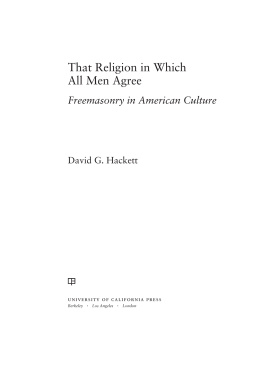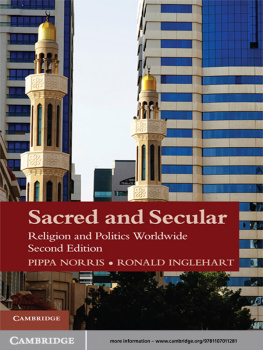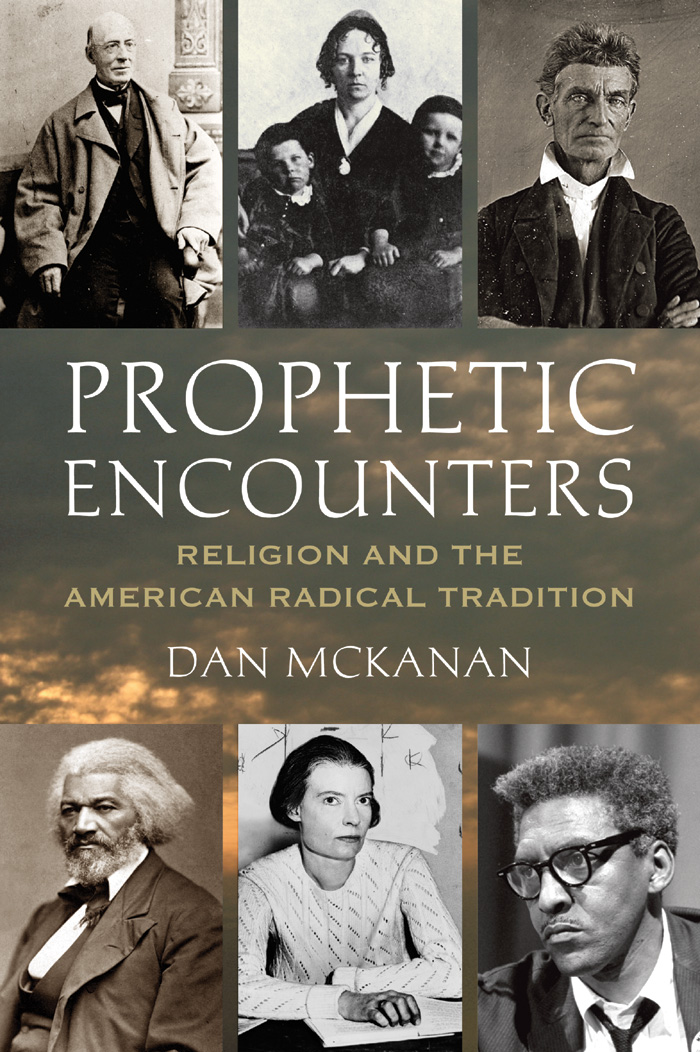Prophetic Encounters
Religion and the American Radical Tradition
DAN MCKANAN
Beacon Press
BOSTON
Beacon Press
25 Beacon Street
Boston, Massachusetts 02108-2892
www.beacon.org
Beacon Press books
are published under the auspices of
the Unitarian Universalist Association of Congregations.
2011 by Daniel Patrick McKanan
All rights reserved
Printed in the United States of America
14 13 12 11 8 7 6 5 4 3 2 1
This book is printed on acid-free paper that meets the uncoated paper ANSI/NISO specifications for permanence as revised in 1992.
Text design and composition by Wilsted & Taylor Publishing Services
Library of Congress Cataloging-in-Publication Data
McKanan, Dan
Prophetic encounters : religion and the American radical tradition / by Daniel Patrick McKanan.
p. cm.
Includes bibliographical references (p. ) and index.
ISBN 978-0-8070-1315-1 (hardcover : alk. paper)
E-ISBN 978-0-8070-1316-8
1. Religion and politicsUnited StatesHistory. 2. IdeologyReligious aspectsHistory. I. Title.
BL2525.M3925 2011
CONTENTS
INTRODUCTION
Everyone needs a history, especially those who seek to change the future. When radical activists confront the entrenched legacy of racism and sexism in both our institutions and our textbooks, we are tempted to imagine that all history supports the status quo. In an era in which prominent representatives of American Christianity are outspoken in their support of reactionary politics, it is easy to imagine that the history of religion is doubly conservative. But there have always been American radicalsand those radicals have always drawn strength from their diverse faiths, Christian and Jewish, pagan and Buddhist, orthodox and humanist. To forget our predecessors work is not only to risk repeating their mistakes, it is to lose their wisdom and inspiration. And so, as we organize our neighborhoods or march on Washington, we must tell the stories of the cloud of witnesses who came before us. To encounter them is to discover the human sources of radical faith.
On August 11, 1841, Frederick Douglass made his first public speech at a convention in Nantucket. The prospect of addressing white people, Douglass would later recall, was a severe cross because he still felt myself a slave. Yet the act of speaking proved to be liberating for Douglass and revelatory for his audience. I spoke but a few moments, Douglass wrote in his autobiography, when I felt a degree of freedom. The antislavery editor William Lloyd Garrison, for his part, reported that I think I never hated slavery so intensely as at that moment. Certainly, my perception of the enormous outrage which is inflicted by it, on the godlike nature of its victims, was rendered far more clear than ever. For both men, their meeting was an encounter with the divine, and they retained a sense of its religious power long after their personal paths diverged. Thirty years later, Douglass mused that it was only through his
Echoes of this sentiment can be heard in every American movement for social transformation. A century after Garrison met Douglass, a radical journalist named Dorothy Day found herself longing to encounter the poor and oppressed immigrants, whom she regarded as collectively the new Messiah. Noticing that most immigrants were Roman Catholics, she joined the church, but soon missed the militant idealism of her socialist past. Why, she wondered, could not Catholicism also gather bands of men and women together for social change? Day launched a national network of farms and households where pious Catholics, committed radicals, and the desperately poor encountered one another as they fed the hungry, comforted the afflicted, and afflicted the comfortable.
A similar hunger for encounter brought several feminists together in a California storefront in the 1970s. They had already had their consciousness raised, but they yearned to tap more deeply into the womanpower that, they believed, had inspired ancient worship of the goddess and the medieval healing practices that were stigmatized as witchcraft. Their conversation about magic became a ritual, as the women took hands, and started breathing together. Realizing that a circle had been cast, they anointed themselves, kissed, and began chanting the names of ancient goddesses, entreating them to pour out your light and your radiance upon us.... Shine! Shine! Shine! As the energy subsided, they chose a coven name, Compost, thus reassuring themselves that whatever magic brings, it will not take away our ability to laugh at ourselves. They also realized that magic could empower them to change the world. Coven leader Starhawk introduced their Spiral Dance at a massive demonstration against a nuclear power plant, and soon pagan-inspired rituals were an integral part of direct action campaigns against war, environmental destruction, and globalization.
The empowering encounters of William Lloyd Garrison, Frederick Douglass, Dorothy Day, and Starhawk stand in a tradition that has gone by many names. Some would call it the path of the prophets. Others speak of the American radical tradition or simply the Left. It is the tradition of abolitionists who called on their neighbors to immediately renounce the sin of slavery, of feminists who recognized patriarchy as itself a form of slavery, of socialists who labored to build a cooperative commonwealth, and of pacifists who saw war as the ultimate affront to humanity.
What holds this tradition together is the experience I have tried to encapsulate in my opening vignettes. When human beings encounter one another deeply, in the midst of their struggles for freedom and equality and community, prophetic power is unleashed. This is power to denounce, to condemn those who would grind the faces of the poor into the dust, in the words of Isaiah. It is also power to announceto proclaim Gods Kingdom that will be realized here on earth, the beloved community of black and white and brown together, the new society within the shell of the old. Prophetic power enables people to speak boldly in the face of brickbats and bludgeons and fire hoses. It empowers them to tell new stories and build new communities. Because interpersonal encounters are the source of this power, their place within radicalism is analogous to the role of divine revelation within traditional Christianity, Judaism, or Islam. For this reason, I describe them as prophetic encounters.
By placing prophetic encounters at the heart of my story, I hope to share three guiding insights about the American radical tradition. First of all, it is a tradition. Too often we remember abolitionism or feminism or socialism as self-contained movements that emerged in response to particular social problems and disappeared when those problems were overcome or changed form. Such memories obscure the way in which activists of each generation have built alliances and drawn inspiration, religious convictions, and strategies from those who have gone before. Garrison and Douglass were as eloquent in denouncing the sin of sexism as the sin of slavery, and they helped to inspire the pacifists and socialists of their day. They also pioneered activist tactics that have lasted for centuries. Garrison used his imprisonment for libeling a slave trader to raise awareness of his cause, while Douglass repeatedly refused to leave segregated railway cars until he was expelled by force; Dorothy Day and Starhawk were among the thousands who followed in their footsteps, facing arrest for refusing to participate in civil defense drills or for disrupting the 1999 World Trade Organization meeting in Seattle. One scarcely needs seven degrees of separation to trace the personal connections among the four: Garrisons grandson was among the founders of the pacifist Fellowship of Reconciliation, which worked with the Catholic Worker movement to sponsor the civil defense protests and Vietnam-era draft-card burnings; the first man to go to prison for draft-card burning would later marry Starhawk. Though the Left has not always been one big happy family, even in its divisions and rancor it has been a family.


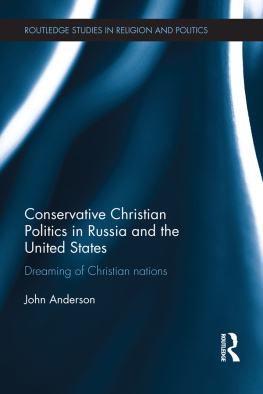
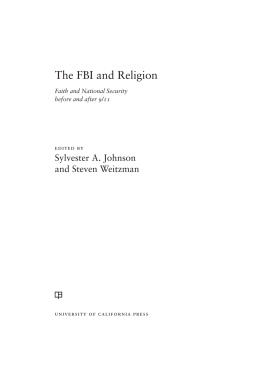
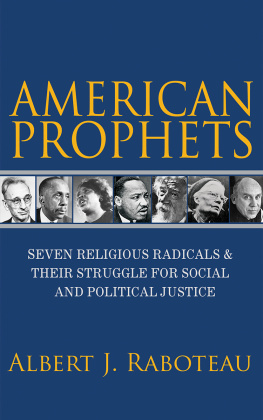
![Blackford - Freedom of religion [and] the secular state](/uploads/posts/book/167779/thumbs/blackford-freedom-of-religion-and-the-secular.jpg)
